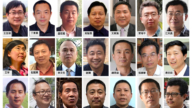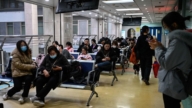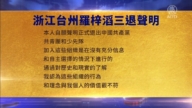【新唐人2013年06月06日讯】中共喉舌《新华网》报导,中共中纪委办公室已经派出10个中央巡视组,进驻有关地区和单位,展开为期两个月左右的所谓新一轮巡视工作。然而,对于中央巡视组成员的身份和巡视组的权力,在巡视过程中是否能起到实效作用?引起了外界的争议。
今年中共中央巡视工作动员暨培训会议提出,今年上半年,中央巡视组将对内蒙古、江西、湖北、重庆、贵州、水利部、中国储备粮管理总公司、中国进出口银行、中国出版集团、中国人民大学开展巡视。
然而,香港《信报》发表评论文章说,巡视组虽然权力很大,可以听取汇报,个别谈话,实地调研,列席会议,查阅记录等等,但最为尴尬的是,他们没有可以先斩后奏的尚方宝剑。
文章指出,中央巡视组存在三大尴尬。尴尬之一:官员的身份。由于中央巡视组是由中纪委派出,组长都是些没有办理离职退休手续的省部级官员;尴尬之二,巡视组对谁负责的问题。虽然巡视组享有中央赋予的权力,但没有办案的职能;而第三大尴尬是,对于中央巡视组的宣传,既要宣传但又不能很详细。
北京时政观察人士华颇表示,派中央巡视组这个方法并不新鲜,因为在中国古代就有御史巡按制度。中共现在这样做,只能说是新一届领导人采用巡视组这样一种方法,来达到收权和示威的目地。
北京时政观察人士华颇:“习上台以后他要干成一些事情就要建立一个非常强势的中央,就是要加强中央极权,这样一来就要收地方支权,让地方服从中央,听中央的话。”
大陆民主人士恩广:“这只是习近平上台的一个策略,那就是:还要巩固和笼络他下面的官员。”
据报导,这次巡视组“巡视”的对像和范围,主要是按照中共中纪委书记王岐山指出的会议要求,从“贪腐”、“作风”、“政治纪律”、“用人”方面查找“省部级官员”的违法违纪问题。
而巡视组的组长成员,却是从已经离开一线工作岗位,但还没有年满70岁的省部级(正职)官员中选任。巡视组组长被任命后,工作到年满70岁才正式办理退休。
华颇认为,安排退下来的那些官员去查案,当局的想法恐怕太天真。
华颇:“在中国人际关系很重要,他虽然退下来了,但是还会和地方有一些千丝万缕的关系,因为还有一些朋友的关系,还有一些是老部下、老同事、老熟人的关系,甚至还有一些亲戚关系,这种关系是错综复杂,水很深。”
恩广: “他们的效果会很有限,那官员,中国不管是监督部门,还是调查部门,还是调研部门下去调研,都不外乎是走走过场而已。他们没有一个健全的社会监督的机制。”
5月27号,中共中央第一巡视组进驻“中国储备粮管理总公司”开始巡视,结果,5月31号,“中储粮”黑龙江林甸直属粮库就发生大火,媒体报导说,损失近亿元人民币。舆论认为,大火非常蹊跷。甚至有民众猜测,是粮食贪官纵火,以此来毁灭亏空的罪证。
采访编辑/唐睿 后制/萧宇
Chinese Communist Party Central Inspection Teams Effectiveness Questioned
The official Xinhua News Agency website reported that
the Chinese Communist Party(CCP) authorities
have sent out ten central inspection teams.
These working groups have been stationed in some regions
and enterprises, to undertake two-months of work inspection.
However, the teams’authority, the team leaders’status,
as well as their effectiveness have met with controversy.
In a motivational training meeting, it was announced that
the central inspection teams will carry out nationwide
inspections during the first half of this year.
Their scope covers Inner Mongolia,
Jiangxi, Hubei, Chongqing and Guizhou.
This includes the Ministry of Water Resources,
China Grain Reserves Corporation (Sinograin),
the Export-Import Bank of China,
China Publishing Group Corporation,
and Renmin University of China.
According to the Hong Kong Economic Journal,
these task groups have been given a lot of power.
However, it is thought they lack the power that enables
them to act without needing to ask permission to do so.
Critics highlight three difficult issues
that face these central inspection teams.
Firstly, the status of the team leaders.
The teams were sent by the CCP Central
Discipline Inspection Commission.
The team leaders are all provincial-level officials,
who have stepped down from leadership posts.
This is largely due to old age, whilst
they haven’t yet to apply for retirement.
Secondly, it is brought into question
whom the task groups report to?
The workgroups are empowered to make inspectional tours,
but aren’t empowered with the role of handling any cases.
Thirdly, the publicity of the central
inspection teams is questioned.
Hua Po, political observer in Beijing, commented.
The central authorities dispatching
inspection teams is not new, he says.
In ancient China, there existed a
system of imperial itinerant inspectors.
Hua Po views it as the new CCP leaders’approach to
centralize power, displaying the central authorities’strength.
Hua Po:"Xi Jinping has to set up a robust
central power to back him within his role.
That is, to strengthen the centralized totalitarian regime
by centralizing political power from local authorities."
En Guang, China pro-democracy activist:"This
is a strategy that Xi Jinping has implemented.
That is, to cement ties with, and
to rope in, the subordinate officials."
Reportedly, the inspection teams will target provincial-level
officials who have violated laws, and the CCP disciplines.
The inspection scope will cover the following areas:
corruption, misconduct, Party discipline,
and staff promotions and demotions.
Team leaders are all provincial-level CCP officials who are
nearing 70 years old, and have otherwise stopped working.
Once appointed, the inspection team leaders,
will work until the age of 70, and then retire.
Hua Po says it is a naive idea that the CCP authorities
are using these retired officials to investigate cases.
Hua Po:"In China, personal connections are very important.
He has stepped down from his leading post,
but he is still active in his social network.
He has some friends, old colleagues,
old acquaintances, and some relatives.
These connections are complex and mixed."
En Guang: “Their work can only produce limited results.
Chinese officials, no matter whether they
are in charge of oversight, investigation or
research, are all going through the ‘motions’.
China lacks an effective watchdog mechanism."
On May 27, the No. 1 Central Inspection
Team began their work in Sinograin.
On May 31, a fire broke out in a Sinograin grain
depot located in Lindian, Heilongjiang Province.
There was a financial loss of nearly 100 million yuan.
The public questioned the occurrence of this fire.
Some speculated that it the fire was started
by officials, to destroy evidence of deficits.


























